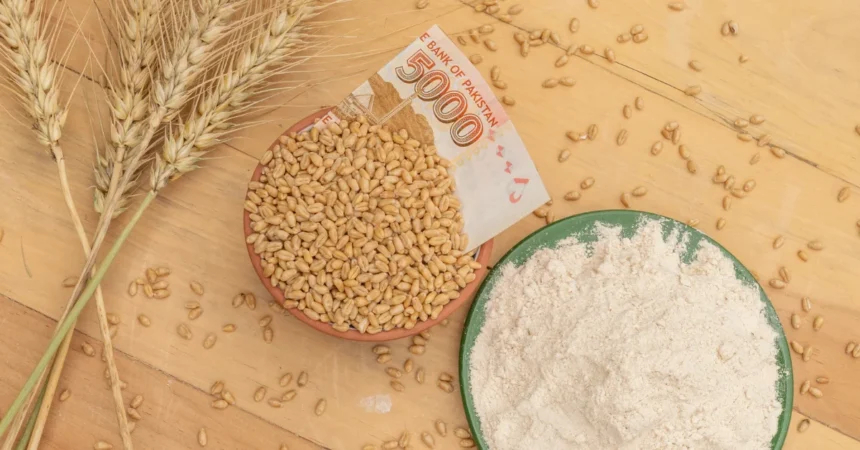Introduction
The recent spike in flour prices in Karachi has created a wave of concern among consumers, economists, and policymakers alike. Flour, a staple food item for many households, has seen its price soar to an alarming Rs. 2,200 per 20kg bag. This significant increase not only affects the affordability of basic food items but also raises serious questions about food security in the region. As families struggle to cope with rising costs, understanding the factors contributing to this price hike and its broader implications becomes essential.
Overview of Flour Price Trends
Historically, flour prices in Pakistan have been relatively stable, with seasonal fluctuations influenced by crop yields and demand. However, recent trends indicate a dramatic shift. In the past few months, Karachi has experienced an unprecedented increase in flour prices, jumping from Rs. 1,500 to Rs. 2,200 per 20kg bag. This rise represents a staggering increase of over 46%, leaving many consumers in distress as they grapple with budgeting for essential food items.
Factors such as inflation, increased production costs, and disruptions in supply chains have played a pivotal role in this escalation. The price increase is reflective of broader economic challenges facing Pakistan, including currency depreciation and rising energy costs, which have compounded the difficulties faced by consumers.
Causes of the Price Surge
1. Supply Chain Disruptions: One of the primary reasons behind the rising flour prices is the disruption in supply chains caused by various factors. The ongoing economic challenges have led to increased transportation costs, affecting the price of flour as it moves from mills to retail outlets. Furthermore, logistical challenges exacerbated by political instability and weather-related events have contributed to the supply issues.
2. Increased Production Costs: The cost of raw materials, particularly wheat, has seen a sharp increase. With wheat being the primary ingredient for flour, any rise in wheat prices directly impacts flour production costs. The recent hikes in fuel prices have also escalated operational expenses for millers, leading to increased flour prices to maintain profit margins.
3. Government Policies: Government policies regarding wheat procurement and pricing can significantly influence flour prices. Delays in wheat distribution from government stocks, coupled with the ban on wheat exports, have created a mismatch between supply and demand. Additionally, the government’s inability to stabilize prices in the face of rising production costs has led to the current crisis.
4. Inflationary Pressures: The overall inflation rate in Pakistan has reached alarming levels, affecting all sectors of the economy. As inflation impacts purchasing power, consumers are forced to spend more on basic necessities, including flour. This inflationary pressure leads to increased demand for affordable alternatives, further straining supply and pushing prices higher.
5. Global Market Trends: Fluctuations in the global wheat market can also have a ripple effect on local prices. Factors such as international trade policies, weather conditions in wheat-producing countries, and global demand dynamics can influence local flour prices. The recent global rise in wheat prices has contributed to the current crisis in Karachi.
Implications for Consumers and Households
The increase in flour prices has far-reaching implications for consumers and households in Karachi. For many families, flour is a staple food item, forming the basis of their daily diet. The current price hike has resulted in a significant strain on household budgets, forcing families to make tough decisions about their food consumption.
1. Reduced Purchasing Power: As prices soar, consumers are finding it increasingly difficult to afford basic food items. Families may resort to purchasing smaller quantities or lower-quality alternatives to manage their expenses, leading to nutritional deficiencies.
2. Increased Food Insecurity: The rising cost of flour exacerbates food insecurity in a country where many households already struggle to meet their basic nutritional needs. The surge in prices could lead to an increase in hunger and malnutrition, particularly among vulnerable populations, including children and the elderly.
3. Social Unrest: The rising cost of essential food items has the potential to ignite social unrest. As public frustration mounts over escalating prices and diminishing purchasing power, protests and demonstrations could become more frequent. The government may face increased pressure to address the crisis and implement measures to stabilize prices.
4. Economic Consequences: The implications of rising flour prices extend beyond individual households. Increased food prices can lead to inflationary pressures throughout the economy, affecting various sectors and reducing overall economic growth. Higher food prices may also result in reduced consumer spending, impacting businesses and employment rates.
Government Response and Initiatives
In response to the crisis, the government has taken various measures to address the rising flour prices and ensure food security. Some of the initiatives include:
1. Wheat Procurement: The government has ramped up efforts to procure wheat from farmers to ensure an adequate supply in the market. By stabilizing wheat prices, the government aims to curb the rising cost of flour.
2. Subsidies and Support Programs: To alleviate the burden on consumers, the government may introduce subsidies for flour and other essential food items. This support could help lower prices temporarily and provide relief to struggling households.
3. Monitoring and Regulation: Increased monitoring of flour mills and retailers has been implemented to prevent price gouging. Regulatory measures aim to ensure that flour prices remain reasonable and accessible to consumers.
4. Public Awareness Campaigns: The government may initiate public awareness campaigns to educate consumers about available support programs and how to make informed choices regarding food purchases. This initiative aims to empower consumers during challenging economic times.
5. Collaboration with Private Sector: The government can collaborate with the private sector to streamline the supply chain and enhance the efficiency of flour distribution. By working together, both sectors can help stabilize prices and ensure a steady supply of flour.
The Future of Flour Prices in Karachi
The future trajectory of flour prices in Karachi remains uncertain, as several factors will play a role in determining the market outlook. While government interventions may help stabilize prices in the short term, the long-term sustainability of flour prices depends on several key elements:
1. Agricultural Productivity: Ensuring a stable wheat supply requires addressing agricultural productivity challenges. Investments in modern farming techniques, crop management, and irrigation systems can enhance wheat yields and reduce reliance on imports.
2. Economic Stability: Achieving economic stability is crucial to managing inflation and food prices. Comprehensive economic reforms, fiscal discipline, and investment in key sectors can contribute to long-term stability.
3. Global Market Dynamics: The impact of global wheat prices will continue to influence local flour prices. Monitoring international market trends and adapting to changes will be essential for local policymakers.
4. Consumer Behavior: As consumers adapt to rising prices, their purchasing behavior may shift. Understanding these changes can help businesses and policymakers tailor their strategies to meet evolving consumer needs.
5. Sustainable Practices: Encouraging sustainable agricultural practices can contribute to long-term food security and stabilize prices. Investments in research, development, and education for farmers can enhance resilience in the face of challenges.
The recent surge in flour prices to Rs. 2,200 per 20kg bag in Karachi has raised significant concerns about food security and affordability for consumers. Understanding the multifaceted causes of this crisis is essential for developing effective responses. As the government and stakeholders work to address the challenges posed by rising food prices, it is crucial to prioritize long-term strategies that enhance agricultural productivity, economic stability, and consumer protection. Only through a comprehensive and collaborative approach can Karachi navigate this crisis and ensure access to affordable and nutritious food for all its residents.
#FlourPriceIncrease #KarachiEconomy #FoodSecurity #Inflation #WheatProcurement #ConsumerAwareness #EconomicStability







